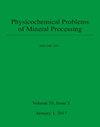Characterization of the effects of acetic acid on the recovery of valuable contents from flotation tailings of non-sulfide metals
IF 1.2
4区 工程技术
Q2 Earth and Planetary Sciences
引用次数: 0
Abstract
Non-sulfide lead flotation tailings draw attention in terms of their valuable contents. Dissolution studies have been carried out with strong inorganic acids, especially in ore form, but these acids have been unfavorable in removal in the context of metal recovery processes. Organic acids, on the other hand, are notable for their environmentally friendly properties and selective metal recovery opportunities. In this study, the effects of acetic acid on metal recovery from oxidized waste were investigated with different experimental parameters at a laboratory scale. Optimal conditions were determined depending on the increase in acetic acid concentration. At 0.75-1.0 M acid concentrations, 49-55% Pb and 49-54% Zn recovery efficiencies were obtained with grades of 7.0-7.2% and 19.5-19.7%, respectively. The recovery of Pb/Zn by the leaching process with acetic acid and the selective non-recovery of iron were also observed through characterization studies. With the Rietveld XRD method, an increase in iron minerals such as goethite and a decrease in smithsonite-hydrozincite minerals were determined. These changes were seen as a decrease in the contents of these minerals in SEM/EDX analysis and as a decrease in smithsonite mineral bond structures in the FT-IR analysis. This study showed that acetic acid has many advantages in the utilization of zinc-lead-containing oxide flotation tailings, which have high economic value, such as selective metal recovery, easy biodegradability, environmental friendliness, and non-corrosiveness.醋酸对从非硫化金属浮选尾矿中回收有价成分的影响特性分析
非硫化铅浮选尾矿中的宝贵成分备受关注。已经使用强无机酸(尤其是矿石形式)进行了溶解研究,但这些酸在金属回收过程中不利于去除。另一方面,有机酸因其环保特性和选择性金属回收机会而备受关注。在本研究中,我们在实验室范围内使用不同的实验参数研究了乙酸对从氧化废物中回收金属的影响。最佳条件取决于醋酸浓度的增加。当乙酸浓度为 0.75-1.0 M 时,铅和锌的回收率分别为 49-55% 和 49-54%,品位分别为 7.0-7.2% 和 19.5-19.7%。通过表征研究,还观察到了用醋酸浸出工艺回收铅/锌的情况以及选择性不回收铁的情况。通过里特维尔德 XRD 方法,确定了铁矿物(如鹅铁矿)的增加和铁闪锌矿矿物的减少。这些变化在 SEM/EDX 分析中表现为这些矿物含量的减少,在 FT-IR 分析中表现为铁闪锌矿矿物键结构的减少。这项研究表明,醋酸在利用具有较高经济价值的含锌铅氧化物浮选尾矿方面具有许多优势,如选择性金属回收、易生物降解、环境友好和无腐蚀性等。
本文章由计算机程序翻译,如有差异,请以英文原文为准。
求助全文
约1分钟内获得全文
求助全文
来源期刊

Physicochemical Problems of Mineral Processing
工程技术-矿业与矿物加工
CiteScore
2.20
自引率
6.70%
发文量
99
审稿时长
3.3 months
期刊介绍:
Physicochemical Problems of Mineral Processing is an international, open access journal which covers theoretical approaches and their practical applications in all aspects of mineral processing and extractive metallurgy.
Criteria for publication in the Physicochemical Problems of Mineral Processing journal are novelty, quality and current interest. Manuscripts which only make routine use of minor extensions to well established methodologies are not appropriate for the journal.
Topics of interest
Analytical techniques and applied mineralogy
Computer applications
Comminution, classification and sorting
Froth flotation
Solid-liquid separation
Gravity concentration
Magnetic and electric separation
Hydro and biohydrometallurgy
Extractive metallurgy
Recycling and mineral wastes
Environmental aspects of mineral processing
and other mineral processing related subjects.
 求助内容:
求助内容: 应助结果提醒方式:
应助结果提醒方式:


